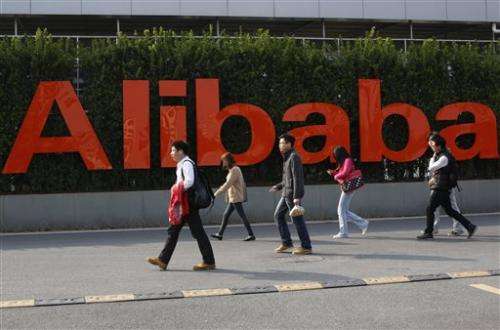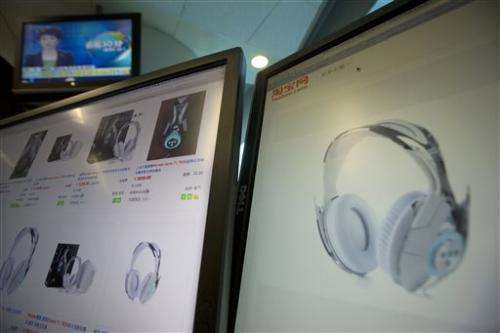Knockoffs a headache for IPO-bound Alibaba

At first glance, the Monster Tron T1 headphones sold on Chinese e-commerce giant Alibaba's Taobao site are a tempting offer for audiophiles looking for state-of-the-art hi-fi equipment.
But sellers omit one key detail: Monster Inc. never produced this model.
"There should be none in existence but our prototypes," said Dave Tognotti, general manager of the California company best known for its audio-visual cables. He said Monster went so far as to announce a launch date but the design proved too complex to build to the company's quality specifications, so it was abandoned.
"You can understand our surprise when we started to see counterfeit versions of this product appearing on websites like Alibaba.com, Aliexpress.com, 1688.com, and Taobao.com," he said. All four sites are part of Alibaba Group. Tognotti said that 99.5 percent of purported Monster products sold on Alibaba sites are fakes, based on thousands of listings the company's investigators have examined over the years.
Phony headphones and other knockoffs are a persistent problem for Alibaba that has grown more urgent since the company started working on a blockbuster initial public offering of shares in the United States. Analysts say the IPO could raise up to $15 billion.
Founder and Chairman Jack Ma has called theft of intellectual property a "cancer" on society and Alibaba has stepped up efforts to root out fakes that dent its credibility with consumers, but there are still complaints.
"To ask for $15 billion to move Alibaba forward is going to open the floodgates on counterfeits," said Craig Crosby, publisher of the Counterfeit Report, a website that flags pirated products sold online.
Alibaba spends more than $16 million dollars a year on anti-counterfeiting efforts. Taobao has 200 staff working on copyright infringement, brand protection and quality control. According to the company's blog, it took down 114 million listings of fake or counterfeit products in the first 10 months of 2013, nearly a third more than for all of 2012.
For such efforts, the U.S. Trade Representative removed Taobao in December 2012 from its Notorious Markets list of counterfeit goods. The report urged Taobao, which has about 800 million listings and requires just a Chinese ID card to start selling, to further streamline procedures to reduce the time needed to take down listings.

Counterfeits are not limited to Alibaba. EBay said in its latest annual report that it faces lawsuits or the threat of lawsuits from brand owners over alleged listings of counterfeit items.
Many hope a U.S. stock listing will give Alibaba the resources and motivation to step up enforcement.
"I'm excited for the IPO because I feel like it will level the playing field," said Nick Wester, founder of The Mainland Group, which sniffs out knockoff products sold online on behalf of brand owners. "As Alibaba moves into the same playing field as Amazon and eBay, they'll have to be responsible and accountable and show that they're taking that responsibility seriously."
Wester's Las Vegas-based company uses image recognition and keyword software to search sites for counterfeits. There are also six Chinese-speaking employees, including two in Beijing, who look for clues that a product is faked, such as using Chinese characters that mimic the sound of a brand name in English.
He said the company has gotten better at responding to complaints, although foreign brand owners still feel like it's the "Wild West."
Alibaba declined to comment, citing requirements to not selectively release information ahead of its initial public offering.
It outlined in its preliminary prospectus the steps it takes to reduce knockoffs, including a complaint system for brand owners and random checks by outside investigators. Violators are given demerit points and if they're penalized four times in a year, they're kicked off. Sellers on TMall, Alibaba's virtual storefront for brands, found to be selling phony goods will have their hefty security deposits seized.
In August, Alibaba agreed to work with the International AntiCounterfeiting Coalition on identifying copycats and fakes on its sites and to cooperate with law enforcement on follow-up investigations. Taobao has signed similar agreements with Louis Vuitton and the Motion Picture Association.
And it is suggesting to brands that they set up shop on Tmall so that they become the clearly authentic seller of their products, a strategy that worked with guitar string maker D'Addario.
But some companies still complain Alibaba isn't doing enough to crack down.
Golf equipment maker Acushnet has seen a "significant increase" in pirated clubs, balls, shoes and clothing bearing its Titleist and FJ brands appearing on Taobao in the past five years, said Jason Yao, the company's Asia Pacific legal counsel. While complaints to eBay usually result in listings removed within 24 hours, it sometimes takes weeks for the site to react "because the complaints often get rejected by their system automatically," he said.
Monster's Tognotti said the company has 12 staff on its anti-counterfeiting team and also uses monitoring software that crawls the Internet looking for suspected knockoffs, which it buys to verify their authenticity or otherwise.
It started reaching out to Alibaba in early 2009 after seeing fakes on the Chinese company's websites and has asked it to take down thousands of listings.
"We have received no cooperation from Alibaba to resolve this matter," Tognotti said.
© 2014 The Associated Press. All rights reserved.

















